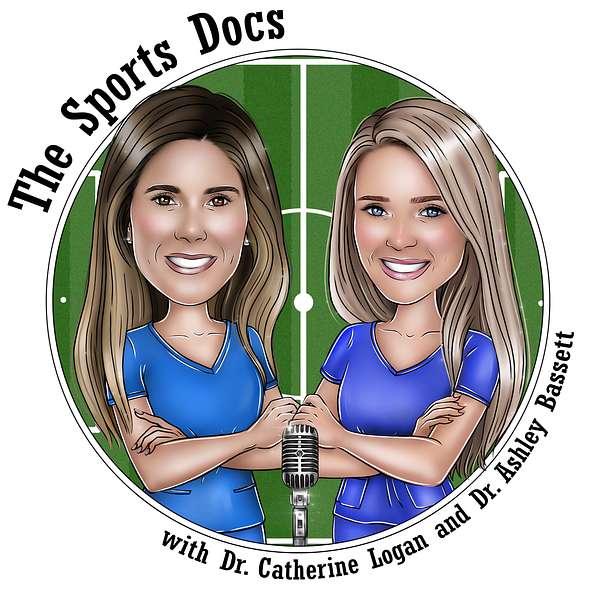
The Sports Docs Podcast
Sports medicine is a constantly evolving field, with hundreds of new articles published each month on the topic. This ever-growing wealth of information can make it challenging to stay updated on the newest approaches and techniques, and to know which data should actually change your practice. Join orthopedic surgeons, Dr. Catherine Logan and Dr. Ashley Bassett, as they chat about the most recent developments in sports medicine and dissect through all the noise.
On each episode of The Sports Docs podcast, the hosts will tackle a specific injury – from ACL tears to shoulder instability – and review the top research from various high-impact journals that month, including The American Journal of Sports Medicine, Arthroscopy: The Journal of Arthroscopic and Related Surgery, Sports Health, Journal of Shoulder and Elbow Surgeons, and more. The Sports Docs will also be joined by experts in the field of sports medicine – orthopedic surgeons, nonoperative sports medicine specialists, athletes, physical therapists, athletic trainers and others – to provide a fresh and well-rounded perspective based on their unique experiences.
The Sports Docs – Dr. Logan & Dr. Bassett – are friends & former co-residents from the Harvard Combined Orthopaedic Residency Program, who went onto esteemed sports medicine fellowships at The Steadman Clinic and The Rothman Institute, respectively. Dr. Logan practices in Denver, CO, and serves as Team Physician for Men's USA Lacrosse & as a Team Physician for U.S. Ski & Snowboard. Dr. Bassett is the director of the Women’s Sports Medicine Center at the Orthopedic Institute of New Jersey and practices across northern NJ, primarily in Morris and Sussex Counties.
Together, they will bring monthly conversations on how to care for athletes of all ages and levels of play, with a healthy mix of cutting-edge science and real-world application.
The Sports Docs Podcast
22. Dr. Melissa Christino: The Mental Side of the Injured Athlete - Part II
We’re going to continue our discussion with Dr. Melissa Christino and dive deeper into the mental side of athletes recovering from ACL injury.
First up is Dr. Hewett’s study Factors Associated With Psychological Readiness to Return to Sport After Anterior Cruciate Ligament Reconstruction Surgery, published in AJSM in 2018. The authors conducted a level 3 cross-sectional study to identify factors that contribute to an athlete’s psychological readiness to return to sport after ACLR. A cohort of 635 athletes who underwent ACLR and had been cleared to RTS completed the Anterior Cruciate Ligament–Return to Sport After Injury scale at an average 12 months after surgery. Demographics (age, sex), sporting outcomes (preinjury frequency), surgical timing, clinical factors, such as laxity, functional measures (such as single-limb hop symmetry), and symptoms of pain and function were also taken.
Univariate analysis for the entire group showed that the following had a positive effect on psychological readiness: male sex, younger age, a shorter interval between injury and surgery, a higher frequency of preinjury sport participation, greater limb symmetry and higher subjective knee scores. In the multivariate model, subjective knee scores and age significantly accounted for 37% of the variance in psychological readiness. The only difference between the groups who had and had not returned to sport was that female sex was a significant contributor for the nonreturn group.
Next up is an additional Hewett and team study. This one is tilted Psychological Readiness to Return to Sport Is Associated With Second Anterior Cruciate Ligament Injuries, published in 2019 in AJSM. The authors set out to determine whether psychological readiness to return to sport is associated with second ACL injury. Patients who had a primary ACLR procedure completed the ACL–Return to Sport after Injury scale before their ACLR and repeated the scale at 12 months after surgery to assess psychological readiness to return to sport. In 329 patients who returned to sport after ACLR, 52 (16%) sustained a second ACL injury. No difference in psychological readiness was observed at the preoperative time point, but patients who sustained a second injury trended toward lower psychological readiness at 12 months compared with noninjured patients. Younger patients with lower psychological readiness are at higher risk for a second ACL injury after return to sport.
We are are particularly excited to also include an article hot off the OJSM press. The senior author is our guest this evening, Dr. Melissa Christino. The study, Psychological Readiness to Return to Sport at 6 Months Is Higher After Bridge-Enhanced ACL Restoration Than Autograft ACL Reconstruction, hypothesized that patients who underwent bridge-enhanced ACL restoration (BEAR) would have higher levels of psychological readiness to return to sport compared with patients who underwent ACLR. It is a level 1 study, randomized controlled trial.
A total of 100 patients with complete midsubstance ACL injuries were randomized to either the BEAR procedure or autograft ACLR and underwent surgery within 45 days of injury. Objective, functional, and patient-reported outcomes, including the ACL--Return to Sport after Injury (ACL-RSI) scale, were assessed at 6, 12, and 24 months postoperatively. The authors found that patients who underwent the BEAR procedure had significantly higher ACL-RSI scores at 6 months compared with those who underwent ACLR (71.1 vs 58.2; P = .008); scores were similar at 12 and 24 months. Baseline factors independently predictive of higher ACL-RSI scores at 6 months were having a BEAR procedure and participating in level 1 sports prior to injury.
Regression analysis of baseline and 6-month outcomes as predictors indicated that the International Knee Documentation Committee (IKDC) score at 6 months explained 45% of the 6-mo